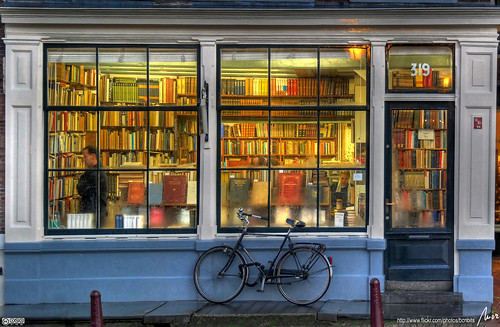Children of Men
Children of Men is a fantastic example of the genre and storytelling. Based off of a book by
P.D. James, director,
Alfonso Cuarón took a couple of liberties with the story by conceptualizing what would the world be like if the Iraq War had spread to a global level, while also examining the issue of immigration in the United Kingdom sometime in the future. The result is spectacular: humanity has lost its ability to reproduce, and chaos seems to have set in around the world. There is a measure of hope when a girl is found who is pregnant, and has to be escorted out of England to a scientific body outside of the country. The film is grim, grounded, dark and expertly shot - one of the highlights is a 10 minute, single take running gun battle at the film's climax.
District 9
District 9 was one of my favorite films of 2009, and as I've noted a couple of times, its story, combined with a reasonably low budget, demonstrates that not all successful movies are blockbusters. Based off of a short film by the same director,
Neill Blomkamp, the movie takes an interesting twist on alien visitation on Earth. A massive alien ship appears over the city of
Johannesburg, South Africa, and its contingent of worker-insectoids, known as the Prawns, coexist roughly with their surrounding humans nearby. Things get problematic when MNU Bureaucrat Wikkus is infected with a substance that puts him between criminal and corporate factions, and he is forced out on the run. The film is expertly shot with handheld footage, interviews and CCTV footage, and is different enough to really stand out. Like
Children of Men, it has an interesting message on immigration and partition within society.
The Fountain
Not a lot of people liked
Darren Aronofsky's film
The Fountain, when it came out, but I suspect that it will be regarded as a classic in the years to come. Combining three stories of a Conquistador, a neurosurgeon and a space man, this movie explores two main themes: the hubris of mankind by trying to cheat death and love that crosses all manners of time. The film itself is wonderfully shot and utilizes visuals as much as story and characters to tie everything together, with shared elements between the three times represented in the movie.
Minority Report
Steven Spielberg is a master storyteller when it comes to the Science Fiction genre, and
Minority Report is possibly one of his finest films to date. Set in 2054, Washington DC is the home to an experiment where murder is stopped before the crime is carried out. Problems occur when the lead detective on the case, John Anderton, is accused of a murder, and is pursued by his own men as he tries to escape and clear his name. What happens next is an interesting exploration of ethics, not to mention an incredible and largely accurate (thus far) view of how the future will run technologically.
Moon
Moon is easily my favorite film of 2009, and is
Duncan Jones' first movie out thus far (although he's apparently got two more to come in the same universe). Following
Sam Rockwell's character Sam Bell, a miner on the moon, who is involved in an accident, then wakes up to find a clone of himself. The film is perfectly conceived, expertly shot, and like
District 9, filmed on a low budget, with models. But what really steals the show is Rockwell and his acting abilities - it's hard for an actor to carry a film, but it's even harder for an actor to carry the film by himself and as two different people. This one's going to be a classic.
Pan's Labyrinth
Guillermo Del Toro's
Pan's Labyrinth is brutal, dark and absolutely gorgeous. Set in 1945, under Franco's Spain, a girl and her mother go out to a remote outpost of a ruthless army captain who is intent on destroying a local pocket of resistance. The girl, Ofelia, is preoccupied with her fairy tales, and discovers a lost and fantastic world of creatures, who tell her that she is a lost princess to an underworld realm. To return, she has to complete a set of tasks. You're never really sure if the fantasy world is real or just imagined, which adds to the discussion after the film. The movie is wonderfully shot, acted and conceived, and is one of my all time favorites.
Pitch Black
Vin Diesel is at his best here as the dark anti-hero Riddick in
David Twohy's film Pitch Black.
Pitch Black is easily the stronger film of the small franchise (
Chronicles of Riddick was fun, but not as good) and sees a transport ship between planets crashing on a deserted planet with a ravenous native life form that comes out after dark. The survivors of the wreck are forced to work together to survive, travelling from their crashed ship to an outpost, aided by the criminal Riddick. The film is wonderfully shot, and is another example of low-budget filmmaking being superior to some of the larger blockbusters. Twohy sets up a fantastic universe in which to play, and while Chronicles didn't quite live up to expectations, I do hope that the remaining two films are made.
The Prestige
This is absolutely my favorite
Christopher Nolan film out thus far, even more so than the
The Dark Knight, by a long shot. The first half of the 20th Century isn't necessarily the first place to think about a science fiction film, but
The Prestige pulls it off in grant fashion. Set between England and the United States at the time, we see two stage magicians try to out maneuver one another in a rivalry that escalates to bloodshed over the death of Robert Angier's wife during a stage accident. The drive for revenge brings Angier to scientist
Nikola Tesla (wonderfully played by
David Bowie) and a device that his both disturbing and fantastic. The visuals here are just jaw dropping, with some of the most beautiful scenes that I've ever seen, along with a twisted and interesting plot that really makes this worth watching many times.
Serenity
Serenity was the little film that could, based off of the little TV show,
Firefly, that refused to die. Bolstered by a vocal fan base,
Joss Whedon's universe was brought back in grant style that helped to tie up some of the remaining loose ends to the show, but was also armed with a fantastic plot that sets the film apart from other continuations and spinoffs. The movie was designed to continue the story, but brings the story back in grant style fit for the big screen, picking up with the Alliance sending an assassin after River, with the crew uncovering a massive plot that undermines the entire basis for the system-wide government of allied planets. Wonderfully shot, excellently acted and a whole lot of fun, Serenity was a great conclusion to the series.
Solaris
Solaris was another film that received lukewarm reviews from critics and viewers, but this film shows some of the most beautiful imagery of any Science Fiction film out there, along with a story that explores the extents of love.
Steven Soderbergh is easily one of my favorite directors, and he does an interesting job with the conception and direction of this movie, which follows psychologist Chris Kelvin as he is dispatched to an ailing space station orbiting a distant star, Solaris. When Kelvin's dead wife appears, the story turns to exploring second changes, reconciliation and alien intelligences that are beyond comprehension.
Stranger Than Fiction
Normally,
Will Ferrell isn't really an actor that I'd look to for a somewhat serious comedy film, but he pulls off what is probably his best acting in
Stranger Than Fiction. This film falls somewhat under the fantasy genre, where Ferrell's character Harold Krick begins to hear a narrator in his head. The film nicely weaves together subtle references to the Beatles throughout, while director Marc Forester utilizes a wonderful minimalist style. Combined with fantastic performances from
Maggie Gyllenhaal,
Dustin Hoffman,
Queen Latifah and
Emma Thompson, Ferrell is in good company for a truely brilliant movie.
Sunshine
Danny Boyle's first (and likely last) entry into the genre,
Sunshine's plot sounds no better than that of
The Core - the sun has begun to go dim, and a crew is dispatched to restart it, using all of the fissionable materials on the Earth and the Moon. What is special about
Sunshine, isn't so much the plot, but what the characters go through. The film is heady, trippy and exciting throughout. Boyle has a unique visual style, and
Cillian Murphy does an excellent job throughout the movie with its large cast as they go through all sorts of problems on their journey. It's an emotional ride, one that is captivating.
Wall-E
Wall-E is my second favorite film from
Pixar, after
Toy Story, and is a fantastic and dark vision of the far future, when humanity has abandoned Earth while massive cleanup operations are conducted, then abandoned. All that is left is a small cleanup robot, Wall-E, who's been alone for hundreds of years, and who falls in love with a probe that returns to see if the planet is safe to return to. Despite director
Andrew Stanton's protests that there was no environmentalist message, it's hard to ignore that there is one, accidental or otherwise. The film is an interesting look at superficial consumerist culture, but also a cute love story between robots.
The films that have made up this list are all tied together by a couple of common elements: story, characters, conception and excellent direction behind the camera. For me, all of these elements help to tell the element that should be central to all films: the story. As such, while there have been a number of films out there in the genre that I've greatly enjoyed, such as Star Wars or Avatar, they really don't make the list because there, it's the special effects that really take the front stage. This is all well and good as far as technology goes, and I'm sure that once I come across a film that uses these technologies to support a story, I'll be very, very happy. But, a good lesson should be learned, I think, that special effects, while cool, and a good reason to see a film, aren't the only reason to see a film. There's been a bit of a resurgence in the past couple of years towards strong genre films with great acting, visuals and story, and it is a trend that I really hope will continue into the next ten years.







